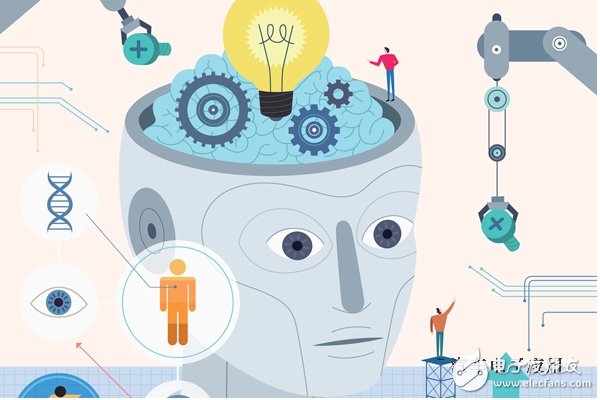British media have highlighted the growing competition between China and the United States in the field of artificial intelligence, suggesting that this technological race is shaping the future of global power dynamics. The interaction between China and the UK in science, industry, and finance is also drawing attention as both nations seek to position themselves in this rapidly evolving landscape.

China: Overtaking in a Corner?
According to a BBC report from January 26th titled “Artificial Intelligence: English, Chinese, and American Performed 'The Romance of the Three Kingdoms'â€, the growth of AI in China has been nothing short of remarkable. From 2012 to now, there have been 1,354 AI companies in China, with a total investment of 144.8 billion yuan. In 2017 alone, AI investment exceeded 62.2 billion yuan—more than a hundred times higher than the 600 million yuan recorded in 2012.
Chinese media have celebrated AI as an opportunity for China to "overtake the curve" or even "outrun the car," helping the country avoid the so-called "middle-income trap." The government has positioned AI as a key driver of industrial transformation and economic development, implementing policies to encourage and support its growth. Since the second half of 2017, the pace of AI development has accelerated significantly. In July 2017, the Chinese State Council released the "New Generation Artificial Intelligence Development Plan," setting clear goals: by 2020, China aims to match global leaders in AI technology and application; by 2025, it expects major breakthroughs in basic AI theories; and by 2030, it seeks to become a global AI innovation center.
A week ago, China also published its first White Paper on AI standardization. Chinese media have dubbed 2017 as the "Year of AI," and 2018 as the pivotal year when AI transitioned from academic research to real-world applications across various industries.
Another indicator of China’s rising influence in AI is the soaring salaries in related fields. Over the past three years, wages in AI sectors have nearly doubled. According to data from the tech job platform 100offer.com, starting salaries for AI graduates in China range from 300,000 to 600,000 yuan annually, while team leaders with 3–5 years of experience can earn up to 1.5 million yuan per year.
United States: No Longer Monopolizing
Despite China's rapid progress, the US still holds a strong position in AI, especially in hardware and foundational technologies. According to a report from China Economic Online, China's AI capabilities are still behind the US, particularly in the chip sector, where most companies are startups, whereas the US has established giants like Intel and NVIDIA.
In terms of basic AI frameworks, companies such as Google, Microsoft, and Amazon lead globally, while Chinese firms like Baidu, Tencent, and Alibaba are catching up. However, the gap in raw technical power remains significant. That said, China has made impressive gains in AI applications, with explosive growth in areas like security, finance, healthcare, education, retail, robotics, and autonomous driving.
In December, the Eurasian Group and risk fund SinovaTIon released a joint report titled “China’s Artificial Intelligence Revolution: Understanding Beijing’s Structural Advantages,†highlighting the growing rivalry between China and the US in the AI domain. The report suggests that the AI hegemony contest is two-way, with technology becoming a central point of Sino-US trade tensions.
While the US leads in cutting-edge hardware and talent, China benefits from its massive internet user base, which provides a vast amount of data fueling AI innovation. The report notes that although China is closing the gap, the competition is not a winner-takes-all scenario—it involves different levels of integration, hybridization, and blending. As AI shapes the future, its trajectory remains uncertain and dynamic.
UK: Need for China Cooperation
The UK has taken steps to integrate AI into government operations, making it the first country to prepare for the introduction of AI in public administration. The British government plans to establish a new advisory body called the Data Ethics and Innovation Center, aiming to collaborate internationally and join the AI Council at Davos. Prime Minister Theresa May emphasized the UK’s leadership in AI during her speech at the World Economic Forum in Davos, Switzerland, on January 25.
But is the UK truly ready to lead in AI? With the US and China investing billions in the sector, the UK appears to be lagging. BBC Technology Correspondent Seren Jones noted that while the UK hosts many top AI researchers in London and Cambridge, these experts often work for global tech giants like Amazon and Google, rather than the UK government. The lack of domestic R&D, limited AI asset protection, and ongoing ethical concerns remain significant challenges.
A week later, Prime Minister May will lead a trade delegation to China for a historic visit to Beijing and Shanghai. Whether this trip will lead to meaningful AI collaboration between the two countries remains to be seen. According to the report, China plays a crucial role in the UK’s post-Brexit economic strategy, making cooperation in AI a strategic priority.
ac dc adapter,dc adapter,ac adapter 12v,dc power adapter,ac dc adapter 24v
FOSHAN SHUNDE KELICHENG POWER SUPPLY TECHNOLOGY CO., LTD , https://www.kelicpower.com